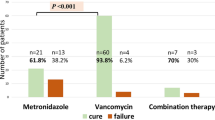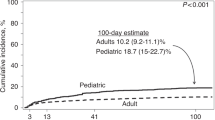Abstract
Clostridium difficile (CD) infection is the main cause of nosocomial enterocolitis in western countries and in patients undergoing allogeneic hematopoietic stem cell transplantation (alloHCT). Recipients of alloHCT are at high risk for CD infection but large studies in this population are rare and conflicting results have been reported. We analyzed 727 patients with AML or MDS undergoing alloHCT in our center from 2004 to 2015. Ninety-six patients (13%) had CD infection and 103 patients (14%) were identified as asymptomatic carriers by screening at admission and once a week during aplasia. Patients with CD infection had a shorter median overall survival of 8 months (95% CI, 6–36 months) compared with 25 months (95% CI, 17–35 months) for patients without CD infection, (HR 1.4, p = 0.04). CD positive patients were less likely to develop acute graft-versus-host disease (aGvHD; HR 0.6, p = 0.004) compared with CD-negative patients, but did not show differences in gastrointestinal aGvHD (HR 0.9, p = 0.5). Symptomatic patients developed gastrointestinal aGvHD (HR 2.5, p = 0.02) more often compared with asymptomatic CD positive patients. This analysis demonstrates a high prevalence for CD infection in patients undergoing alloHCT. A significant lower overall survival for patients with CD infection could be demonstrated.
This is a preview of subscription content, access via your institution
Access options
Subscribe to this journal
Receive 12 print issues and online access
$259.00 per year
only $21.58 per issue
Buy this article
- Purchase on Springer Link
- Instant access to full article PDF
Prices may be subject to local taxes which are calculated during checkout




Similar content being viewed by others
References
Dubberke ER, Reske KA, Srivastava A, Sadhu J, Gatti R, Young RM, et al. Clostridium difficile-associated disease in allogeneic hematopoietic stem-cell transplant recipients: risk associations, protective associations, and outcomes. Clin Transplant. 2010;24:192–8.
Dubberke ER, Sadhu J, Gatti R, Reske KA, DiPersio JF, Devine SM, et al. Severity of Clostridium difficile-associated disease (CDAD) in allogeneic stem cell transplant recipients: evaluation of a CDAD severity grading system. Infect Control Hosp Epidemiol. 2007;28:208–11.
Bagdasarian N, Rao K, Malani PN. Diagnosis and treatment of Clostridium difficile in adults: a systematic review. J Am Med Assoc. 2015;313:398–408.
Climo MW, Israel DS, Wong ES, Williams D, Coudron P, Markowitz SM. Hospital-wide restriction of clindamycin: effect on the incidence of Clostridium difficile-associated diarrhea and cost. Ann Intern Med. 1998;128:989–95.
Tomblyn M, Chiller T, Einsele H, Gress R, Sepkowitz K, Storek J, et al. Guidelines for preventing infectious complications among hematopoietic cell transplantation recipients: a global perspective. Biol Blood Marrow Transplant. 2009;15:1143–238.
Apostolopoulou E, Raftopoulos V, Terzis K, Elefsiniotis I. Infection Probability Score: a predictor of Clostridium difficile-associated disease onset in patients with haematological malignancy. Eur J Oncol Nurs. 2011;15:404–9.
Alonso CD, Kamboj M. Clostridium difficile infection (CDI) in solid organ and hematopoietic stem cell transplant recipients. Curr Infect Dis Rep. 2014;16:414.
Lo Vecchio A, Zacur GM. Clostridium difficile infection: an update on epidemiology, risk factors, and therapeutic options. Curr Opin Gastroenterol. 2012;28:1–9.
Longtin Y, Paquet-Bolduc B, Gilca R, Garenc C, Fortin E, Longtin J, et al. Effect of detecting and isolating Clostridium difficile carriers at hospital admission on the incidence of C difficile infections: a quasi-experimental controlled study. JAMA Intern Med. 2016;176:796–804.
Guddati AK, Kumar G, Ahmed S, Ali M, Kumar N, Hari P, et al. Incidence and outcomes of Clostridium difficile-associated disease in hematopoietic cell transplant recipients. Int J Hematol. 2014;99:758–65.
Lavallée C, Labbé AC, Talbot JD, Alonso CD, Marr KA, Cohen S, et al. Risk factors for the development of Clostridium difficile infection in adult allogeneic hematopoietic stem cell transplant recipients: A single-center study in Québec, Canada. Transpl Infect Dis. 2017;19:e12648. https://doi.org/10.1111/tid.12648.
Willems L, Porcher R, Lafaurie M, Casin I, Robin M, Xhaard A, et al. Clostridium difficile infection after allogeneic hematopoietic stem cell transplantation: incidence, risk factors, and outcome. Biol Blood Marrow Transplant. 2012;18:1295–301.
Staffas A, Burgos da Silva M, van den Brink MR. The intestinal microbiota in allogeneic hematopoietic cell transplant and graft-versus-host disease. Blood. 2017;129:927–33.
Vehreschild MJ, Weitershagen D, Biehl LM, Tacke D, Waldschmidt D, Töx U, et al. Clostridium difficile infection in patients with acute myelogenous leukemia and in patients undergoing allogeneic stem cell transplantation: epidemiology and risk factor analysis. Biol Blood Marrow Transplant. 2014;20:823–8.
Glucksberg H, Storb R, Fefer A, Buckner CD, Neiman PE, Clift RA, et al. Clinical manifestations of graft-versus-host disease in human recipients of marrow from HL-A-matched sibling donors. Transplantation. 1974;18:295–304.
Armand P, Gibson CJ, Cutler C, Ho VT, Koreth J, Alyea EP, et al. A disease risk index for patients undergoing allogeneic stem cell transplantation. Blood. 2012;120:905–13.
Chopra T, Chandrasekar P, Salimnia H, Heilbrun LK, Smith D, Alangaden GJ. Recent epidemiology of Clostridium difficile infection during hematopoietic stem cell transplantation. Clin Transplant. 2011;25:E82–7.
Bruminhent J, Wang ZX, Hu C, Wagner J, Sunday R, Bobik B, et al. Clostridium difficile colonization and disease in patients undergoing hematopoietic stem cell transplantation. Biol Blood Marrow Transplant. 2014;20:1329–34.
Jain T, Croswell C, Urday-Cornejo V, Awali R, Cutright J, Salimnia H, et al. Clostridium difficile colonization in hematopoietic stem cell transplant recipients: a prospective study of the epidemiology and outcomes involving toxigenic and nontoxigenic strains. Biol Blood Marrow Transplant. 2016;22:157–63.
Kinnebrew MA, Lee YJ, Jenq RR, Lipuma L, Littmann ER, Gobourne A, et al. Early Clostridium difficile infection during allogeneic hematopoietic stem cell transplantation. PLoS ONE. 2014;9:e90158.
Mehta RS, Rezvani K. Immune reconstitution post allogeneic transplant and the impact of immune recovery on the risk of infection. Virulence. 2016;7:901–16.
Bobak D, Arfons LM, Creger RJ, Lazarus HM. Clostridium difficile-associated disease in human stem cell transplant recipients: coming epidemic or false alarm? Bone Marrow Transplant. 2008;42:705–13.
Kamboj M, Xiao K, Kaltsas A, Huang YT, Sun J, Chung D, et al. Clostridium difficile infection after allogeneic hematopoietic stem cell transplant: strain diversity and outcomes associated with NAP1/027. Biol Blood Marrow Transplant. 2014;20:1626–33.
Chakrabarti S, Lees A, Jones SG, Milligan DW. Clostridium difficile infection in allogeneic stem cell transplant recipients is associated with severe graft-versus-host disease and non-relapse mortality. Bone Marrow Transplant. 2000;26:871–6.
Trifilio SM, Pi J, Mehta J. Changing epidemiology of Clostridium difficile-associated disease during stem cell transplantation. Biol Blood Marrow Transplant. 2013;19:405–9.
Beelen DW, Elmaagacli A, Müller KD, Hirche H, Schaefer UW. Influence of intestinal bacterial decontamination using metronidazole and ciprofloxacin or ciprofloxacin alone on the development of acute graft-versus-host disease after marrow transplantation in patients with hematologic malignancies: final results and long-term follow-up of an open-label prospective randomized trial. Blood. 1999;93:3267–75.
Ferrara JL, Levine JE, Reddy P, Holler E. Graft-versus-host disease. Lancet. 2009;373:1550–61.
Feltis BA, Kim AS, Kinneberg KM, Lyerly DL, Wilkins TD, Erlandsen SL, et al. Clostridium difficile toxins may augment bacterial penetration of intestinal epithelium. Arch Surg. 1999;134:1235–41. discussion 41-2.
Mathewson ND, Jenq R, Mathew AV, Koenigsknecht M, Hanash A, Toubai T, et al. Gut microbiome-derived metabolites modulate intestinal epithelial cell damage and mitigate graft-versus-host disease. Nat Immunol. 2016;17:505–13.
Acknowledgements
We thank Catrin Theuser for assistance with data management. The dedicated commitment of all nurses, data managers, and physicians who contributed to this analysis is highly appreciated.
Author information
Authors and Affiliations
Corresponding author
Ethics declarations
Conflict of interest
This study was supported by an investigator sponsored research (ISR) grant from Astellas. Astellas has had no role in the study design, data collection or analysis, and paper preparation and submission. The authors declare that they have no conflict of interest.
Additional information
Publisher’s note Springer Nature remains neutral with regard to jurisdictional claims in published maps and institutional affiliations.
Supplementary information
Rights and permissions
About this article
Cite this article
Amberge, S., Kramer, M., Schröttner, P. et al. Clostridium Difficile infections in patients with AML or MDS undergoing allogeneic hematopoietic stem cell transplantation identify high risk for adverse outcome. Bone Marrow Transplant 55, 367–375 (2020). https://doi.org/10.1038/s41409-019-0678-y
Received:
Revised:
Accepted:
Published:
Issue Date:
DOI: https://doi.org/10.1038/s41409-019-0678-y
This article is cited by
-
Effective treatment of Clostridioides difficile infection improves survival and affects graft-versus-host disease: a multicenter study by the Polish Adult Leukemia Group
Scientific Reports (2024)
-
Clinical outcomes of antimicrobial resistance in cancer patients: a systematic review of multivariable models
BMC Infectious Diseases (2023)
-
The incidence and impact of clostridioides difficile infection on transplant outcomes in acute leukemia and MDS after allogeneic hematopoietic cell transplant—a CIBMTR study
Bone Marrow Transplantation (2023)



